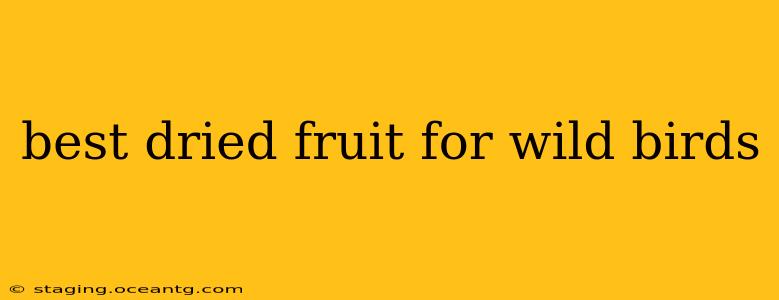Feeding wild birds can be a rewarding experience, bringing joy and enriching your backyard ecosystem. While seeds and nuts form the staple of a wild bird's diet, adding dried fruit can provide a valuable nutritional boost, especially during colder months when natural food sources are scarce. However, not all dried fruits are created equal when it comes to avian nutrition and safety. This guide explores the best dried fruits to offer your feathered friends, along with crucial considerations for responsible bird feeding.
What are the best types of dried fruit for wild birds?
Several dried fruits offer nutritional benefits for wild birds, but moderation is key. The best choices are generally those lower in sugar and higher in fiber:
-
Raisins: These are a popular choice and readily accepted by many bird species. They offer a good source of energy. However, feed them sparingly, as excessive sugar can be detrimental.
-
Cranberries: These tart berries are packed with antioxidants and are a healthier alternative to sweeter options like raisins. Many birds find them appealing.
-
Apples: Dried apple pieces are a good source of fiber and are generally well-received. Choose unsweetened varieties whenever possible.
-
Blueberries: These are another excellent choice, rich in antioxidants and relatively low in sugar compared to other dried fruits.
What dried fruits should I avoid giving to wild birds?
Some dried fruits can be harmful or less beneficial to wild birds:
-
Fruits with added sugars or preservatives: Avoid any dried fruit with added sugars, sulfites, or other preservatives. These can be detrimental to bird health. Look for plain, unsweetened varieties.
-
High-sugar fruits: While fruits like mangoes, pineapple, and bananas offer some nutritional value, their high sugar content should limit their inclusion in a bird's diet. Too much sugar can lead to health problems.
-
Fruits with pits or seeds: Avoid fruits with pits or seeds, such as cherries or plums, as these can pose a choking hazard or contain compounds toxic to birds.
-
Moldy or spoiled fruit: Never offer moldy or spoiled fruit to birds, as this can cause serious illness.
Are there any other important considerations when feeding dried fruit to wild birds?
Yes, several key aspects ensure responsible and beneficial supplementation with dried fruit:
-
Moderation is Key: Dried fruit should be offered as a supplementary treat, not a staple food source. A small amount, incorporated into a broader diet of seeds and nuts, is ideal.
-
Variety is Important: Offer a variety of seeds, nuts, and dried fruits to provide a balanced diet.
-
Cleanliness: Always keep feeders clean and remove any uneaten fruit to prevent spoilage and the spread of bacteria.
-
Water Source: Always provide a fresh water source for birds, especially when offering dried fruit, which can be dehydrating.
-
Observe Your Birds: Pay attention to how your birds react to the dried fruit. If you notice any signs of illness, discontinue feeding that particular type of fruit.
What are the benefits of feeding wild birds dried fruit?
Dried fruit can offer several benefits, particularly during harsh weather:
-
Energy Boost: Dried fruits provide a concentrated source of energy, helping birds stay warm and active in cold temperatures.
-
Nutritional Enhancement: They add valuable vitamins and minerals to a bird's diet, particularly antioxidants.
-
Attracting a Wider Variety of Birds: Introducing dried fruit can help attract a more diverse range of bird species to your feeders.
What type of feeder is best for dried fruit?
While you can scatter smaller pieces of dried fruit on the ground or on a platform feeder, larger pieces are best suited to a feeder with larger perches or compartments to prevent waste and ensure easy access for birds.
By following these guidelines, you can safely and effectively incorporate dried fruit into your wild bird feeding routine, providing a valuable nutritional boost for your feathered friends. Remember, responsible bird feeding practices are crucial for maintaining their health and well-being.
